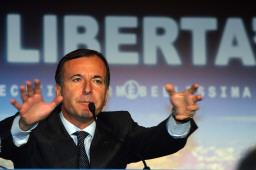Italian Foreign Minister Franco Frattini ruled out dialogue with Palestinian militant group Hamas and called for greater efforts in Afghanistan during a round-table debate in London on Monday.
Speaking at a prestigious think-tank, the Centre for European Reform, Frattini told delegates that the time was not right for talks with Hamas, which holds a majority in the elected Palestinian legislative body.
''Personally, I would like national reconciliation based on the position of [Palestinian President] Mahmoud Abbas, who has our support,'' said the Italian minister.
Frattini, who visited the Middle East this summer for talks with Israeli officials and members of Abbas's Fatah party, said he disapproved of the way Hamas had ''undermined'' the Palestinian president.
Turning to Afghanistan, the Italian minister said a number of European states were not pulling their weight in the area and said it was time for the bloc to develop ''a single European strategy''.
''This is particularly the case given the new US administration will be asking for a greater commitment from Europe, focusing more on the political aspects and not just the issue of troops,'' he said.
US President elect Barack Obama has repeatedly stressed the importance of shifting the focus from Iraq to Afghanistan, and called for greater assistance from Europe during a July speech in Berlin.
In other comments on the future US administration, Frattini said Italy would push for talks between Obama and Russian President Dmitri Medvedev.
The role Italy would play in such talks would depend on who Obama selected as secretary of state, said Frattini, but he said Premier Silvio Berlusconi was keen to see a US-Russian meeting as soon as possible.
The foreign minister, who was European Commission vice-president until taking up his current post in May, also expressed concern over the European Union's climate change policies.
He said it was important the bloc ensured its proposed package of climate change measures were compatible with plans to fend off the looming economic crisis.
In addition, he stressed the importance of dealing with emissions from industrializing countries such as India and China.
''These are two issues that Italy has raised not to block the climate change package or to suspend its implementation but simply to ensure it is analysed thoroughly,'' he said.
Following the debate at the Centre for European Reform, Frattini travelled to Oxford, where he was the guest lecturer for a postgraduate group of students at St Anthony's College.










